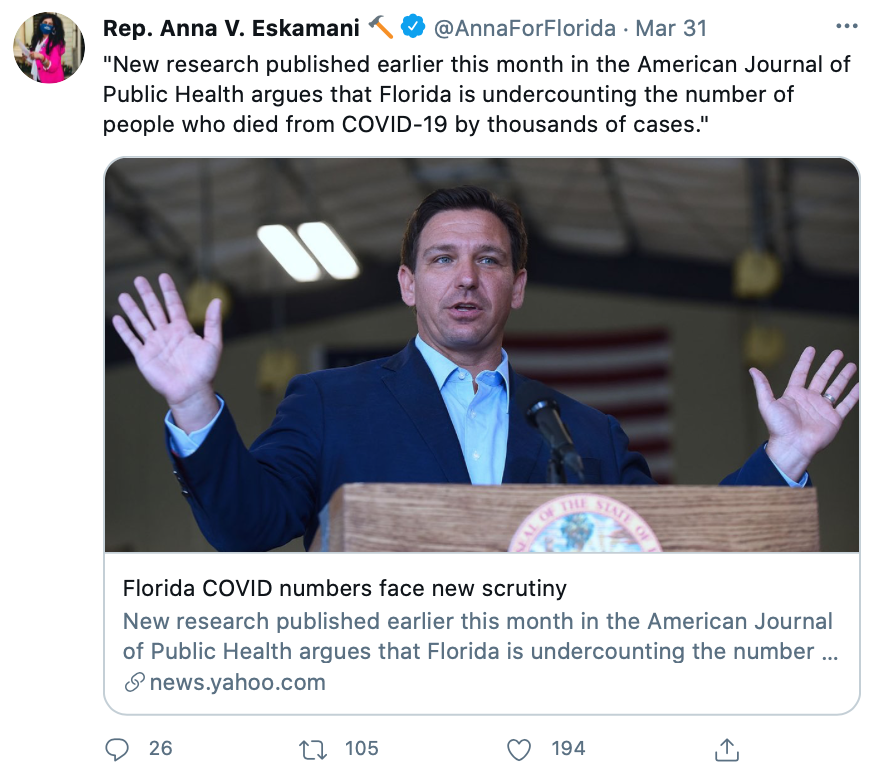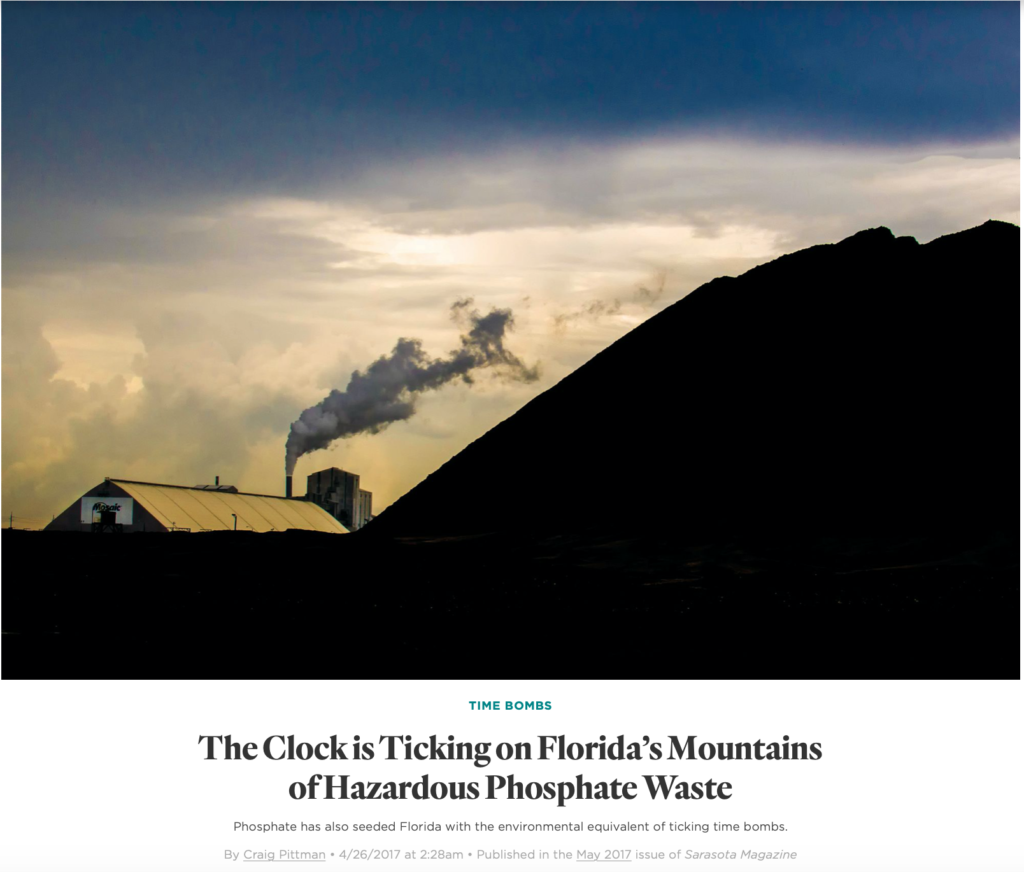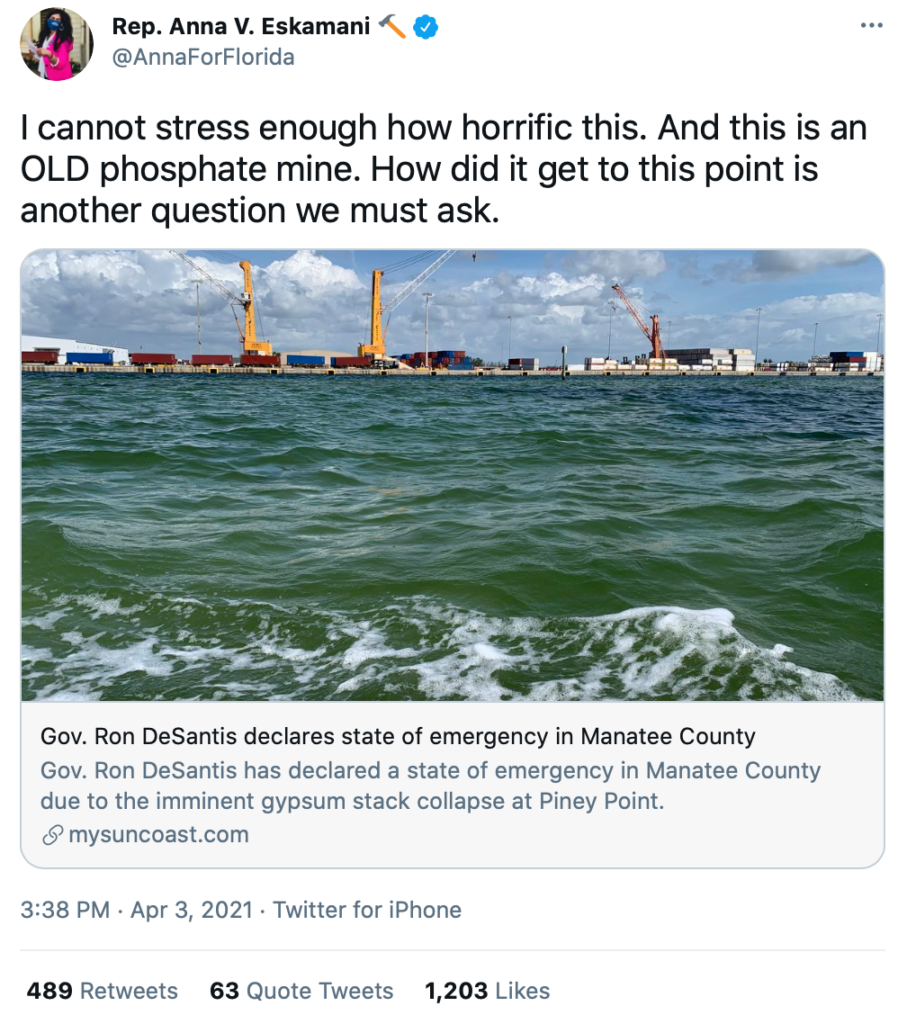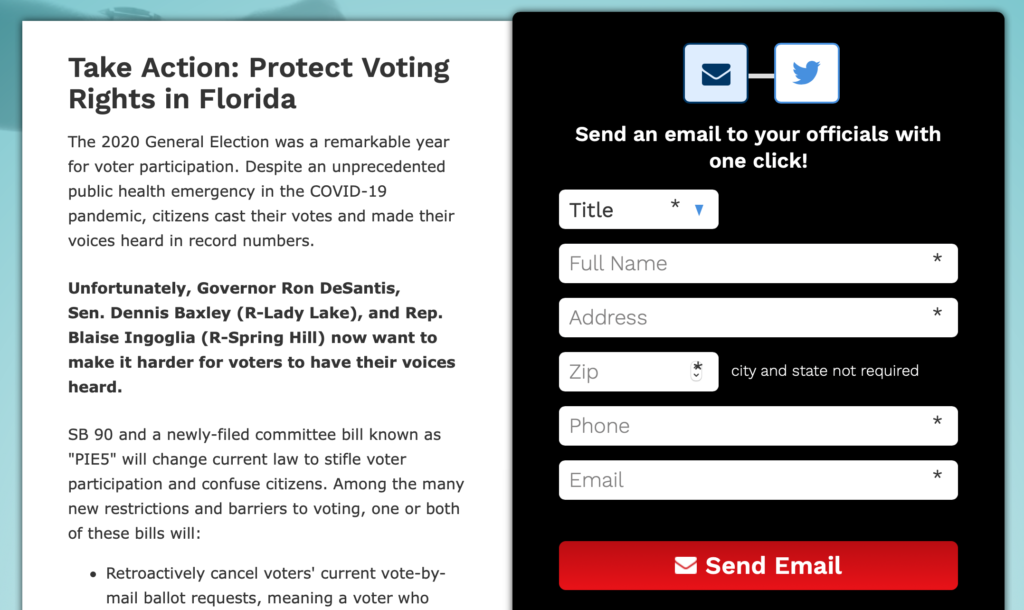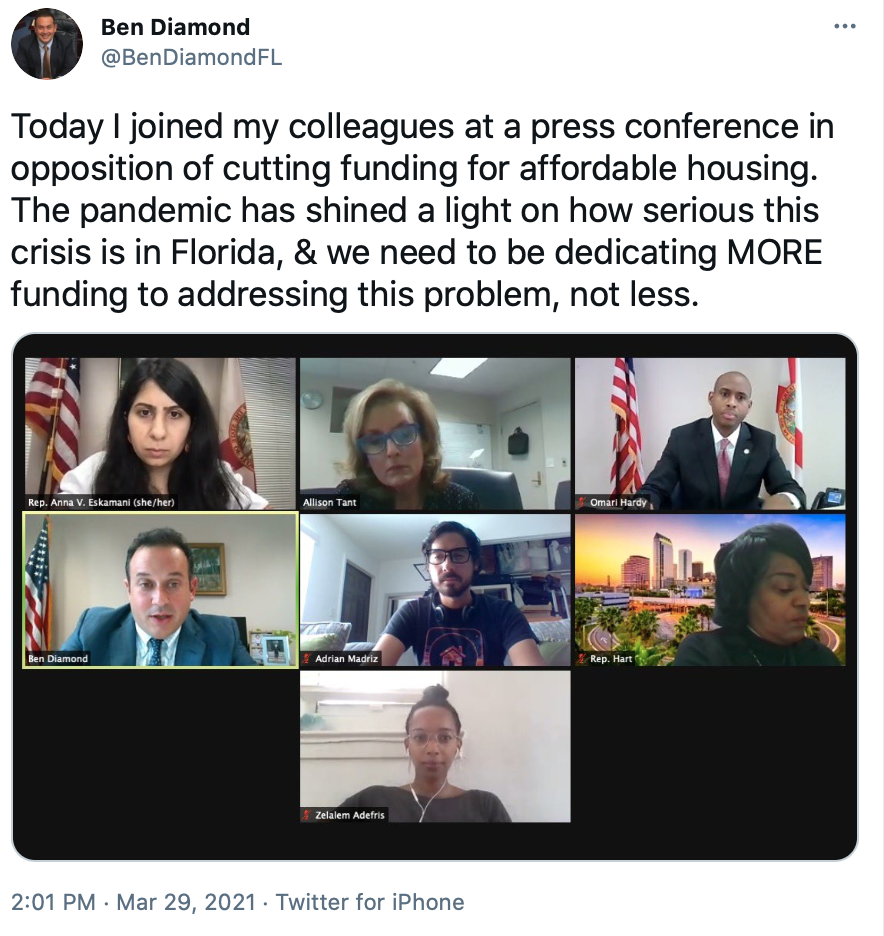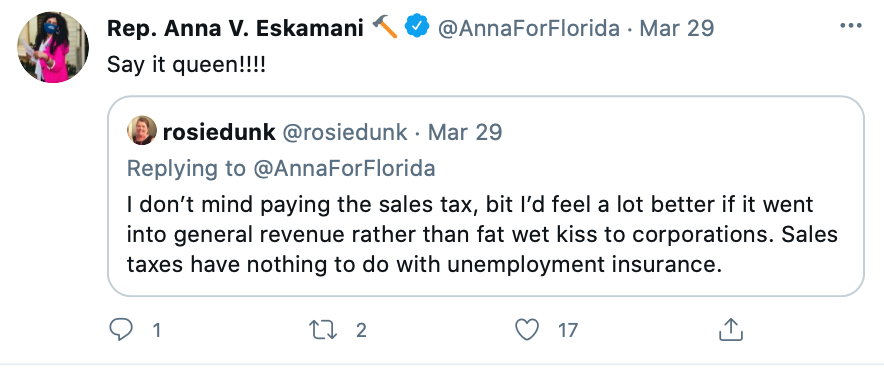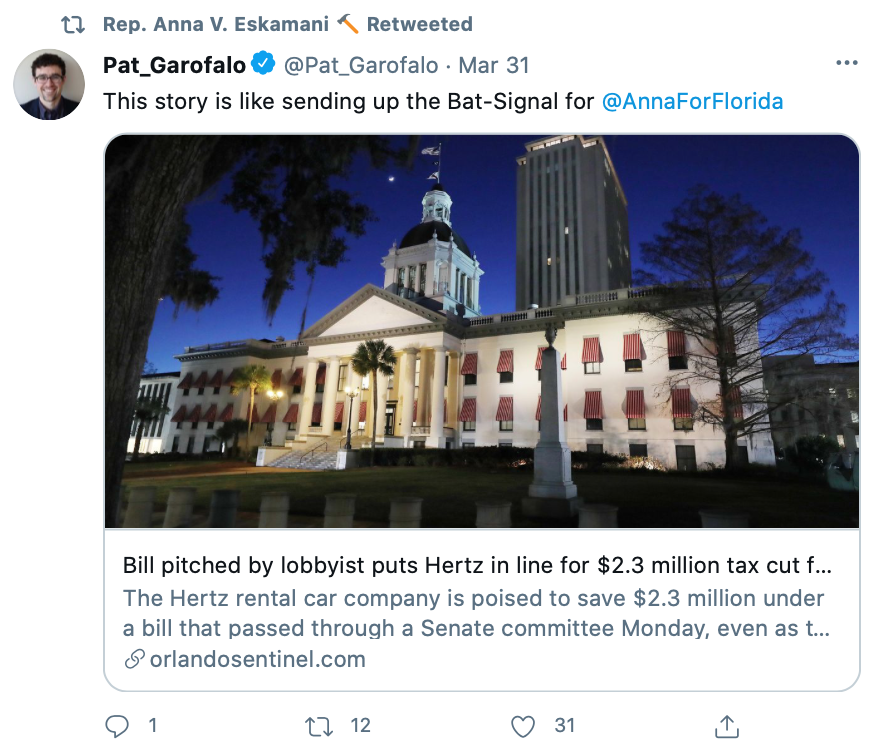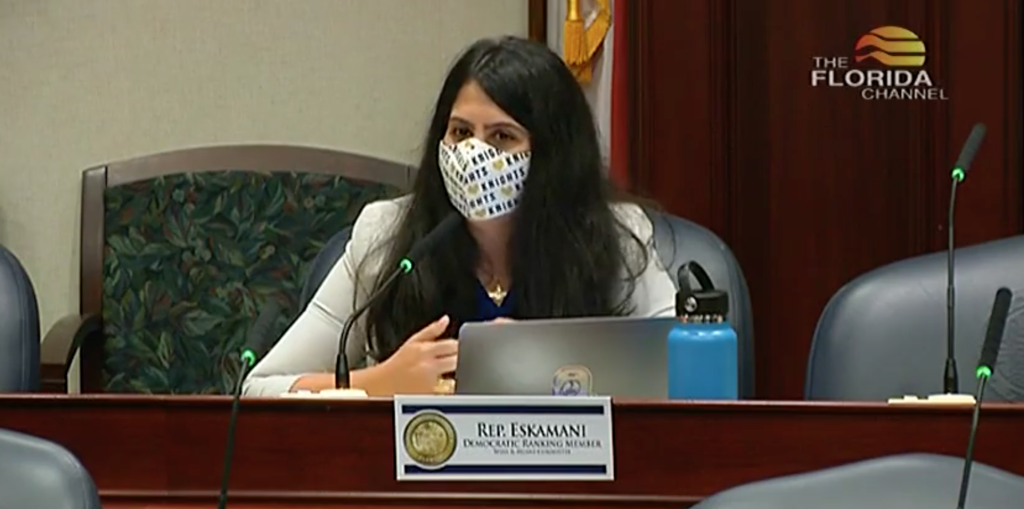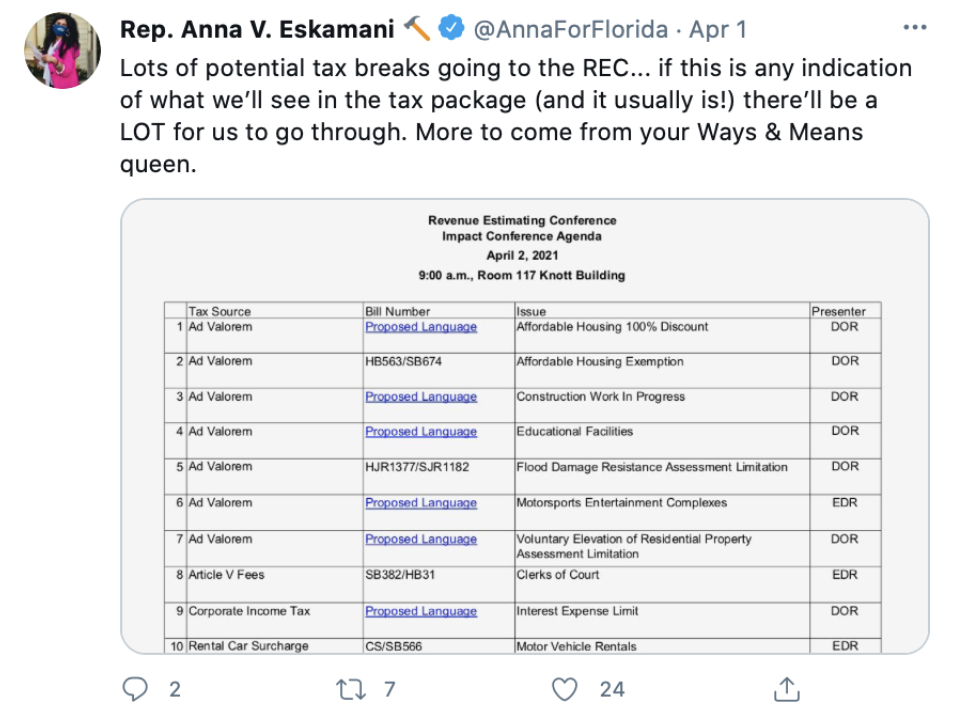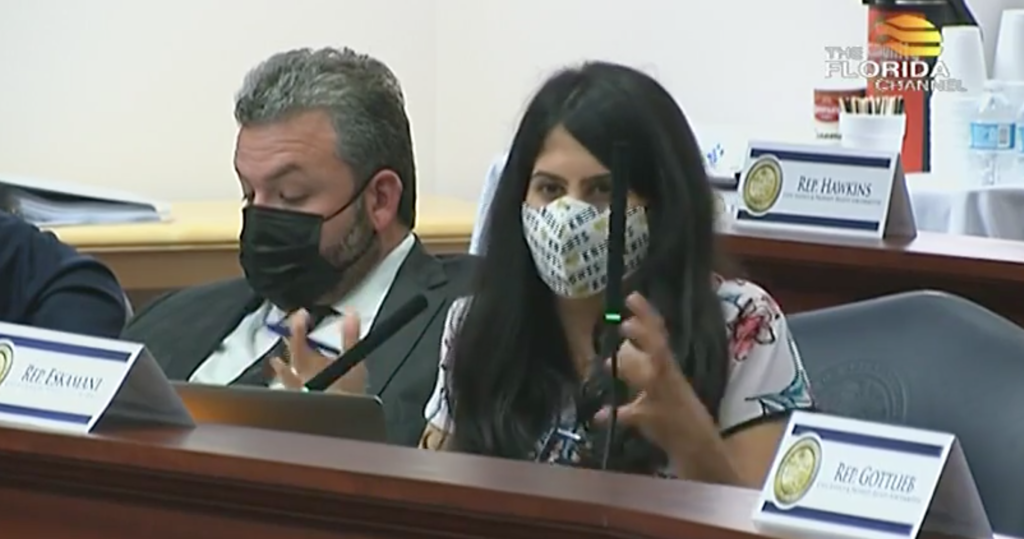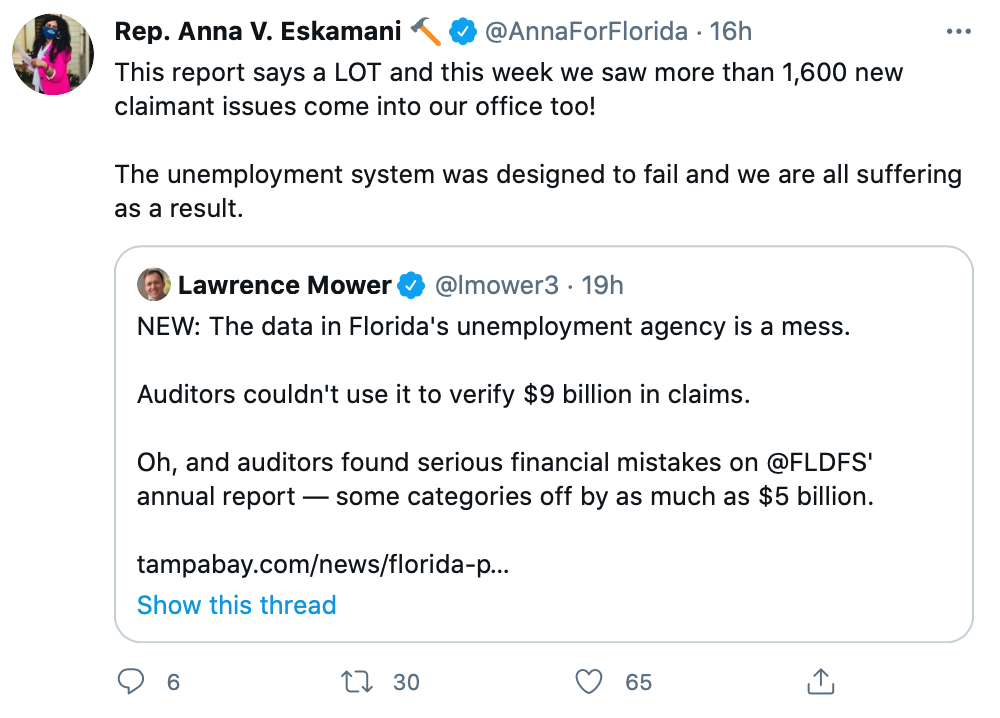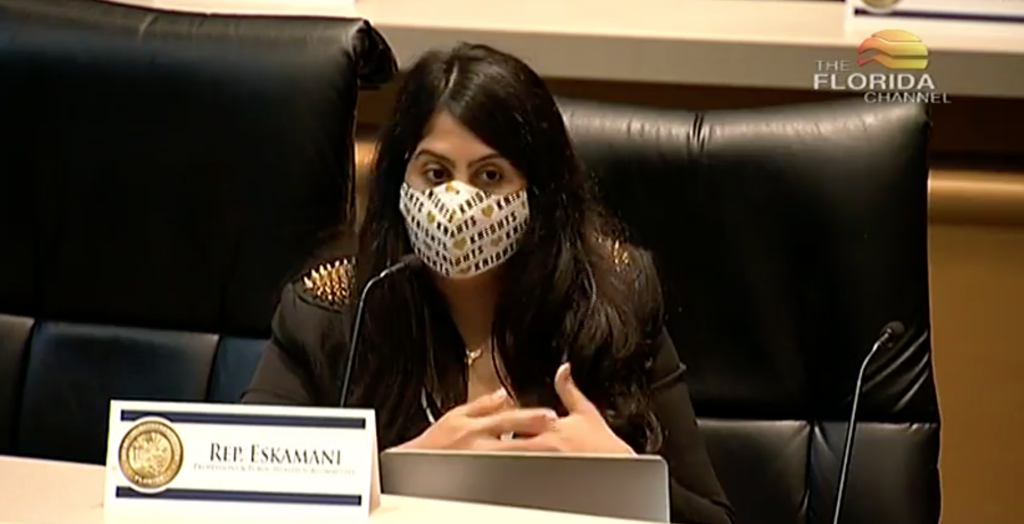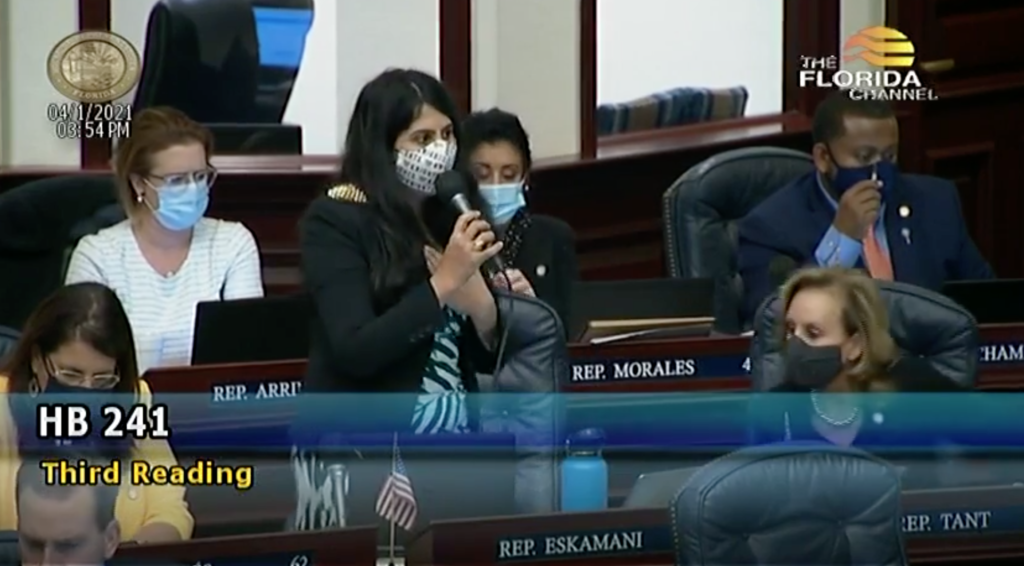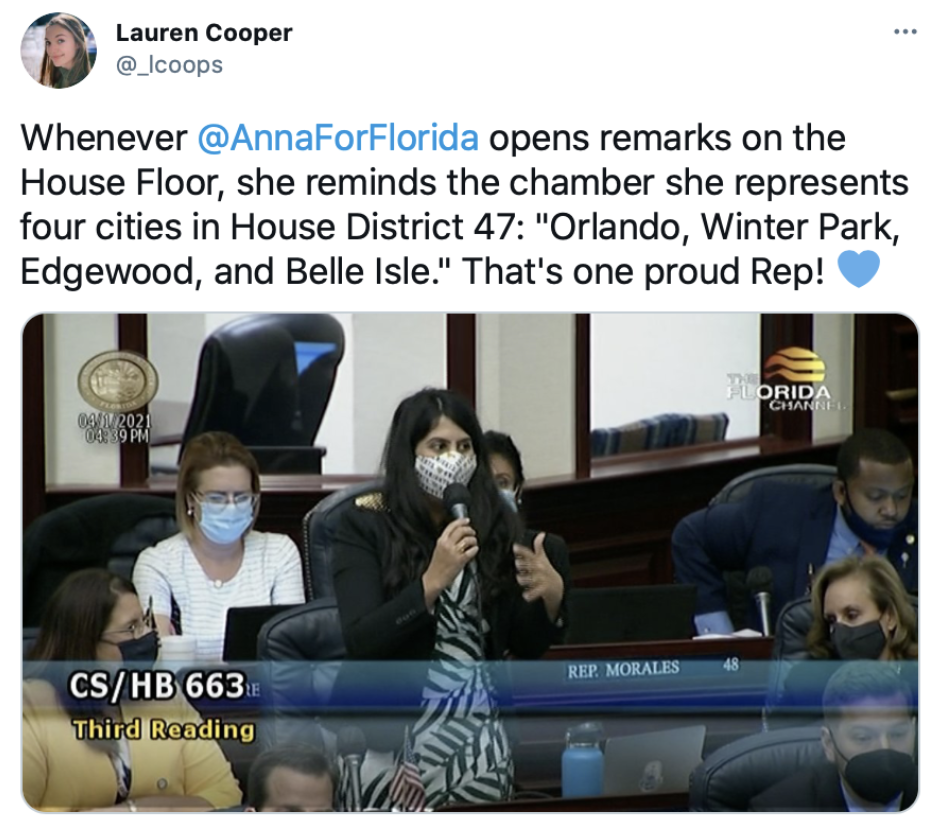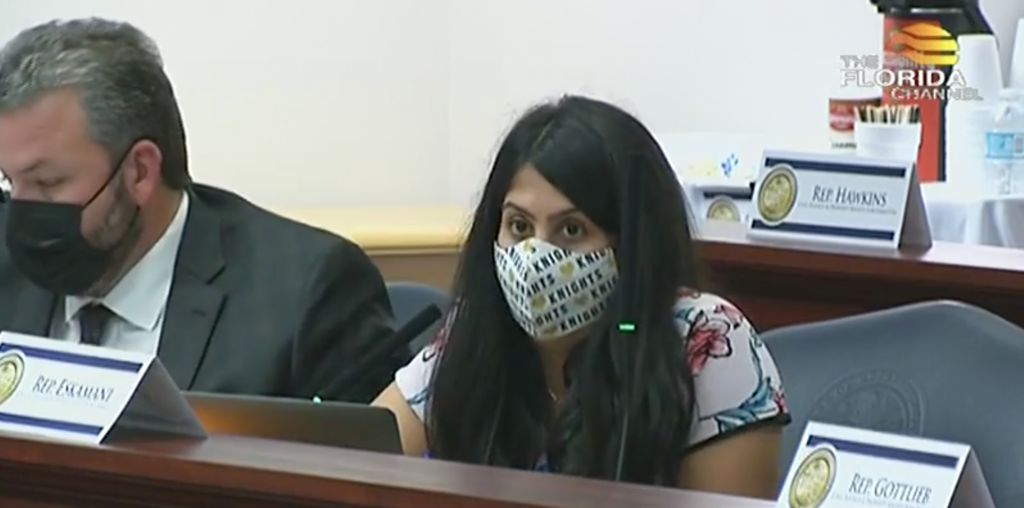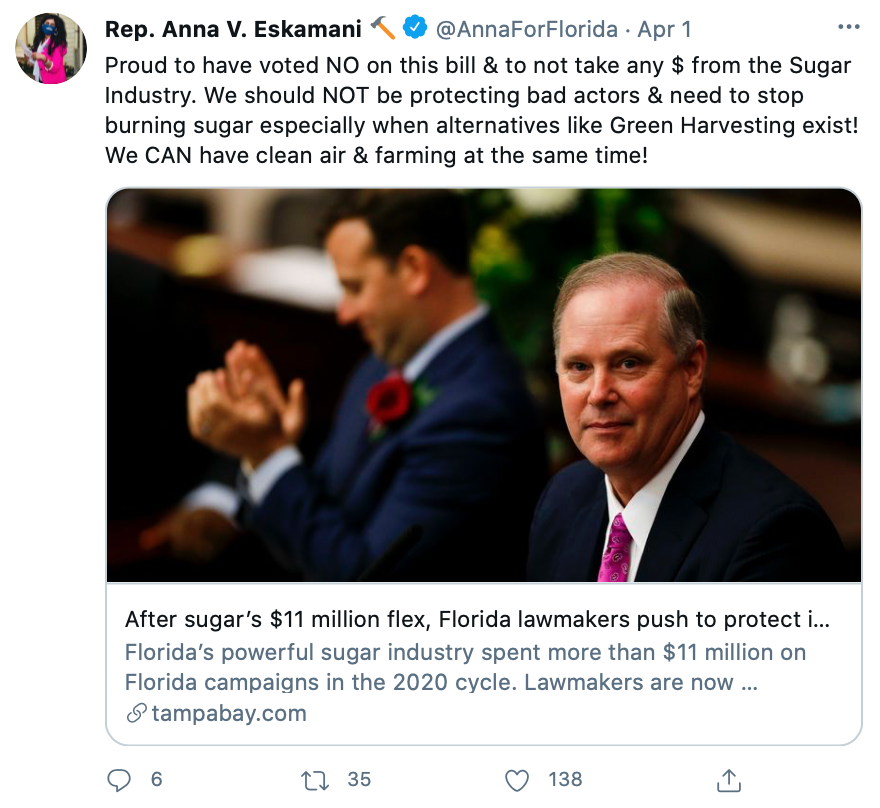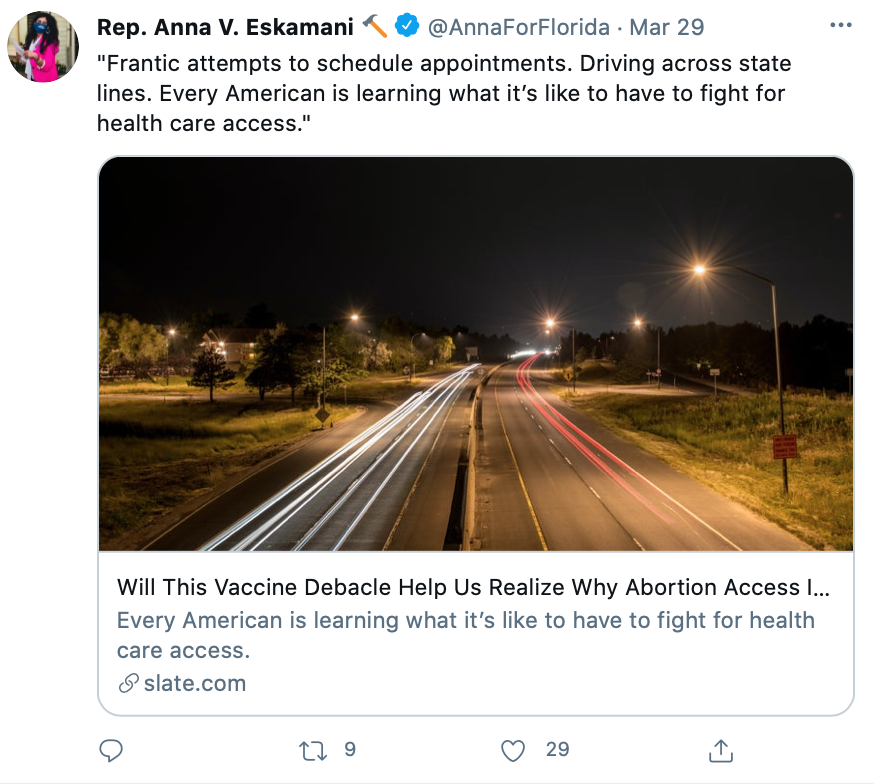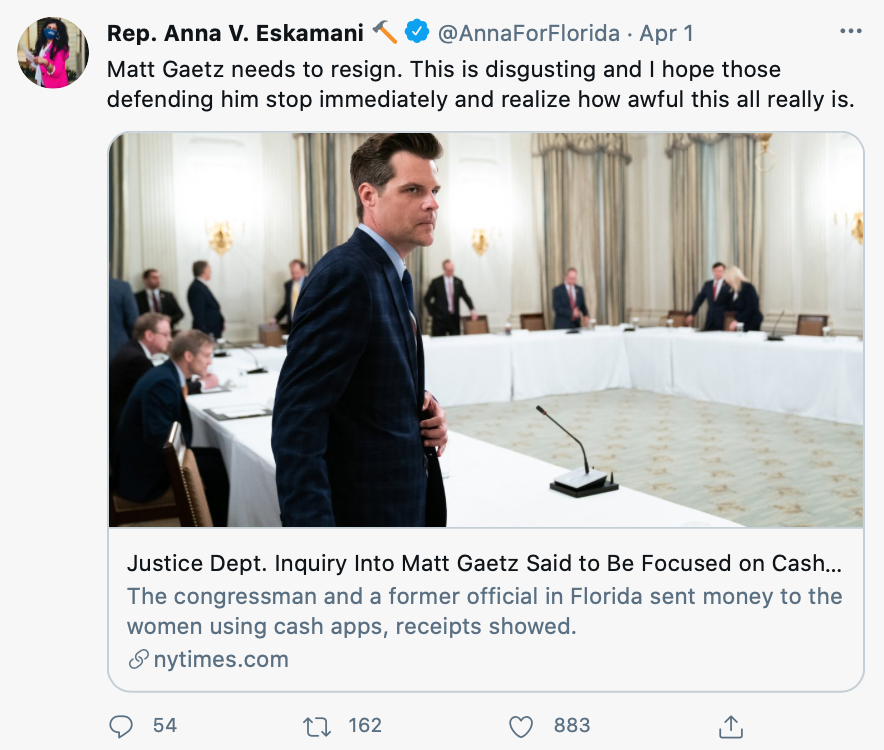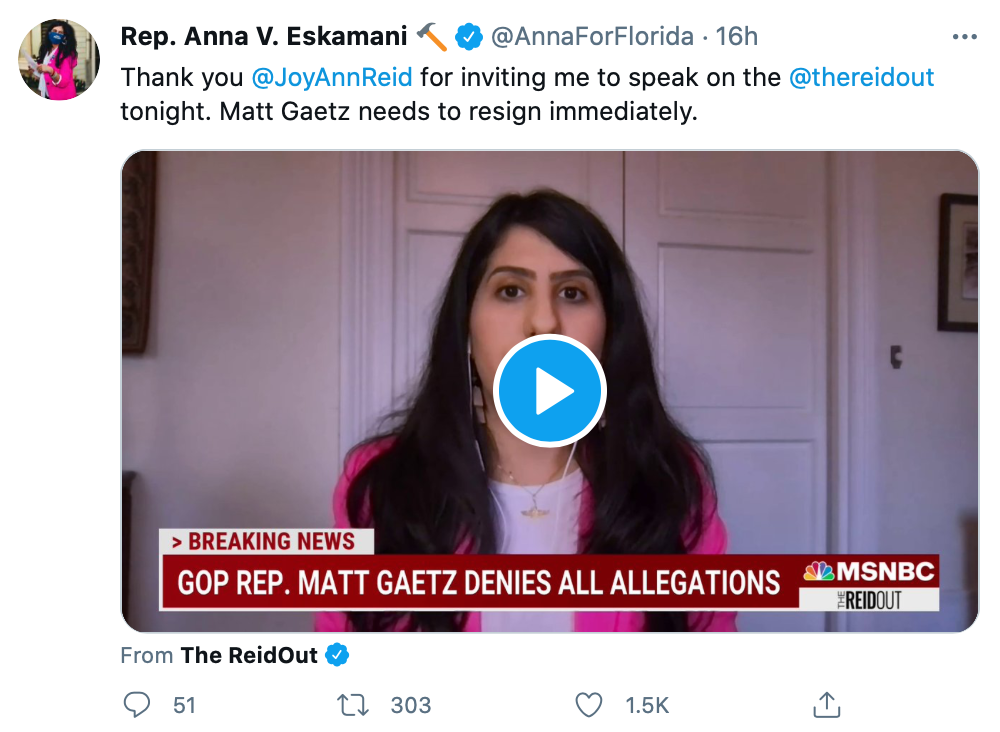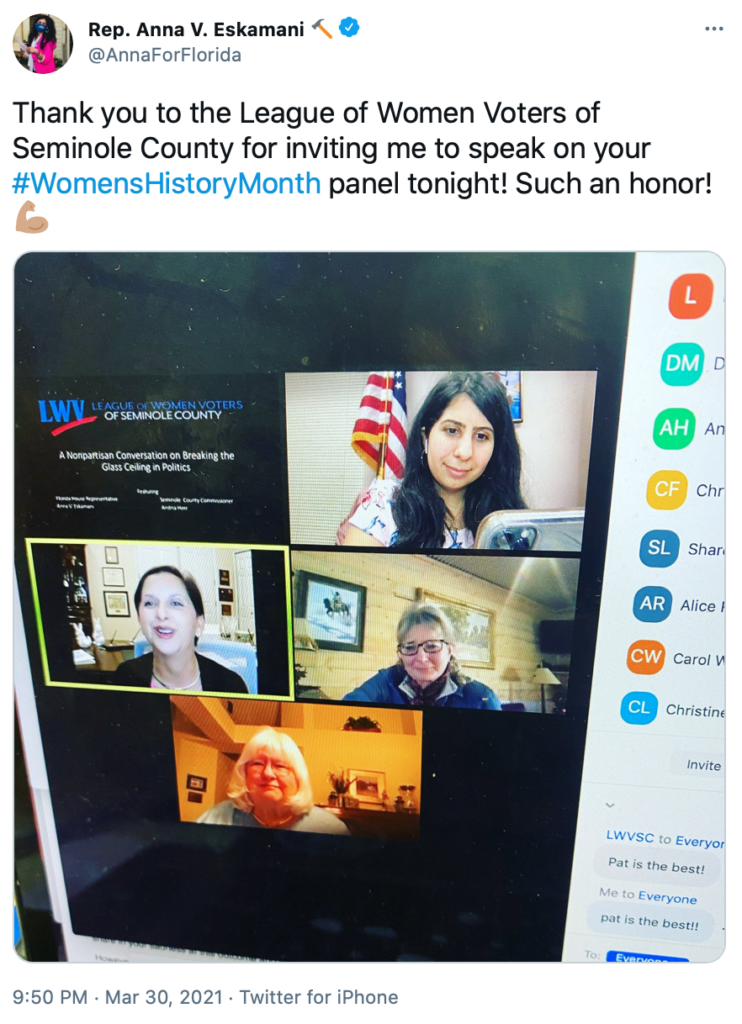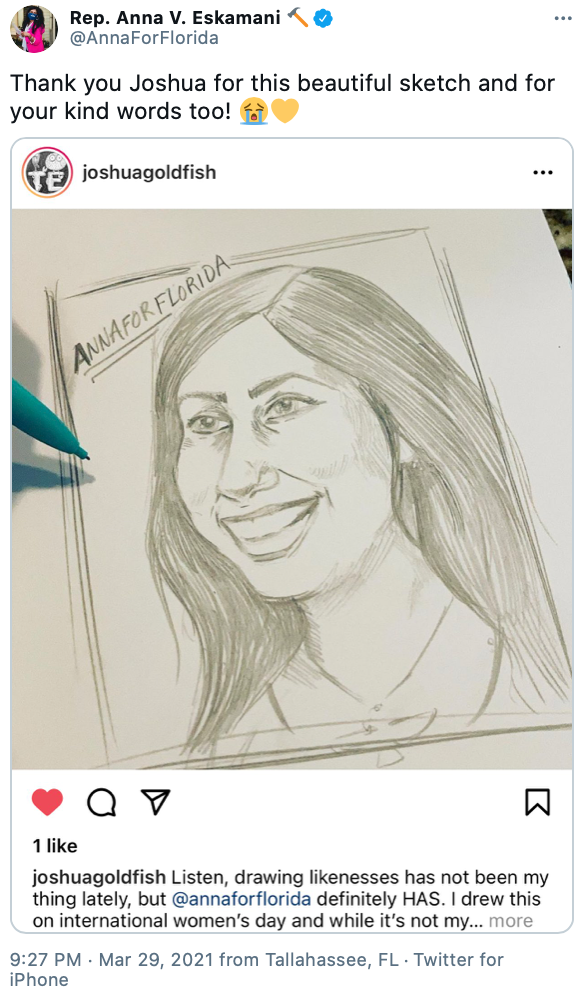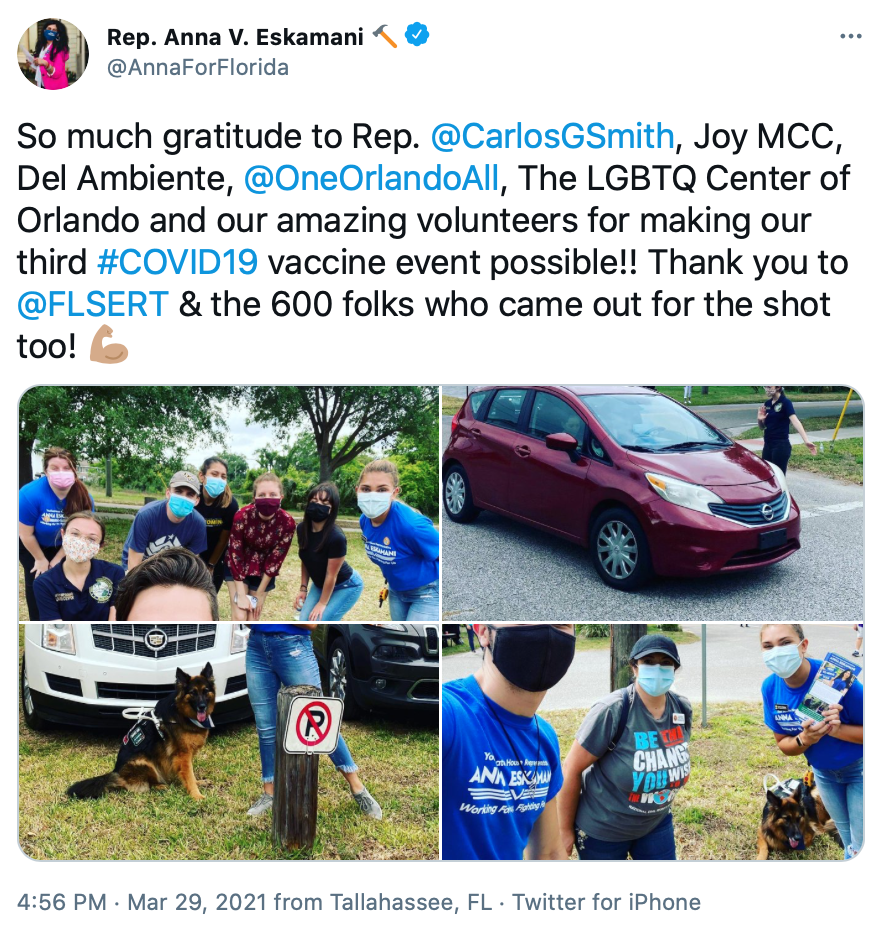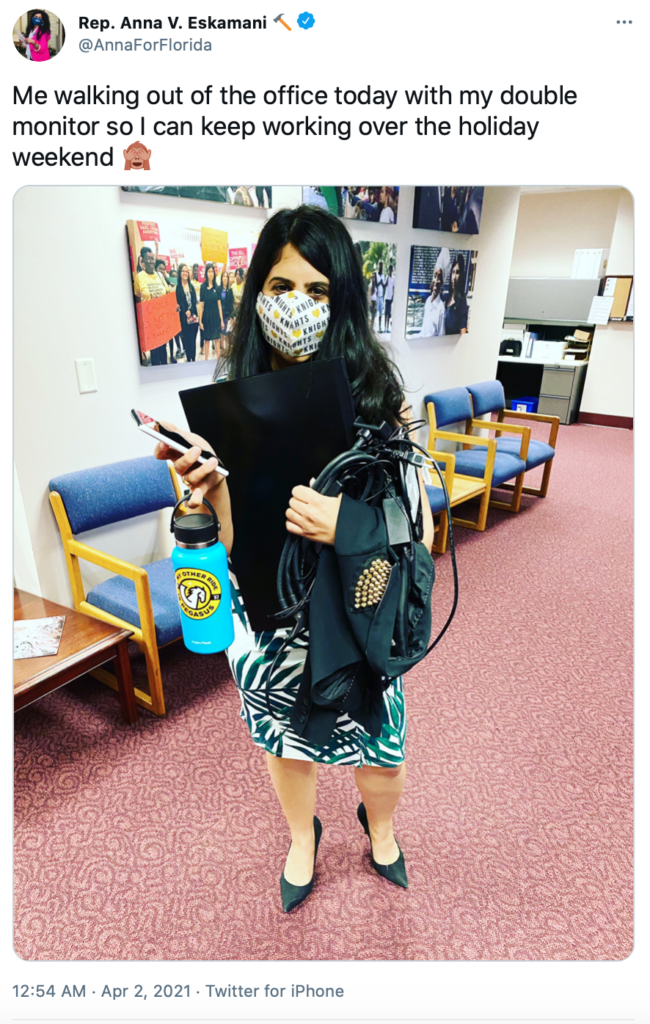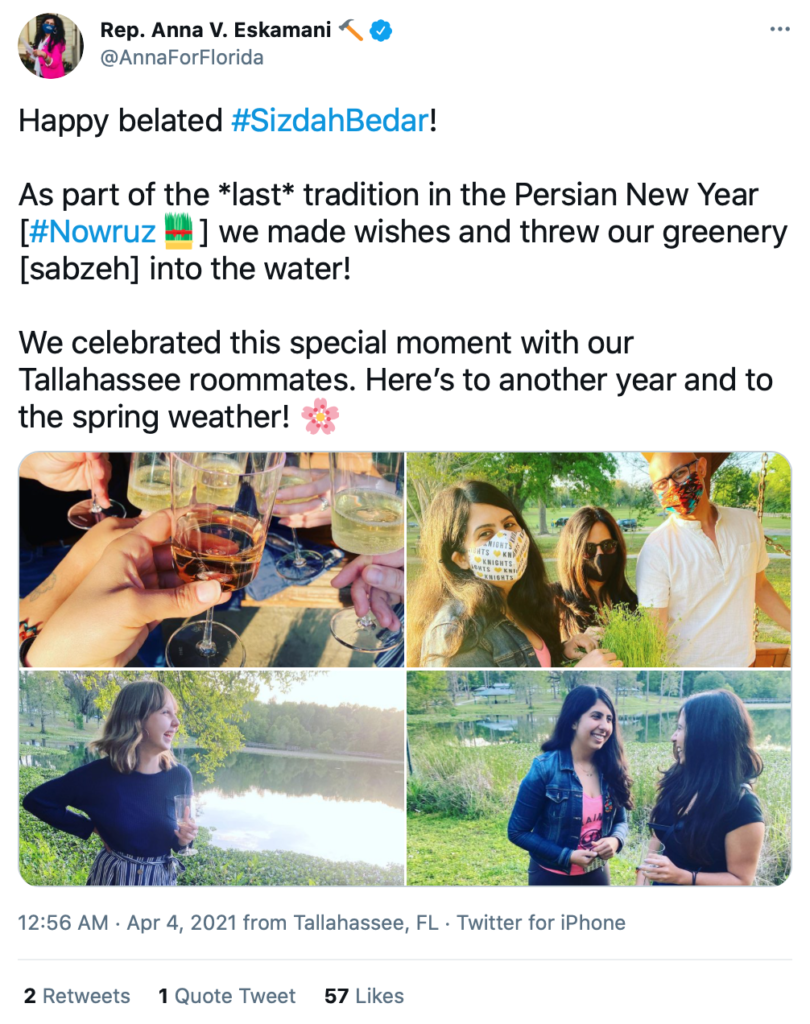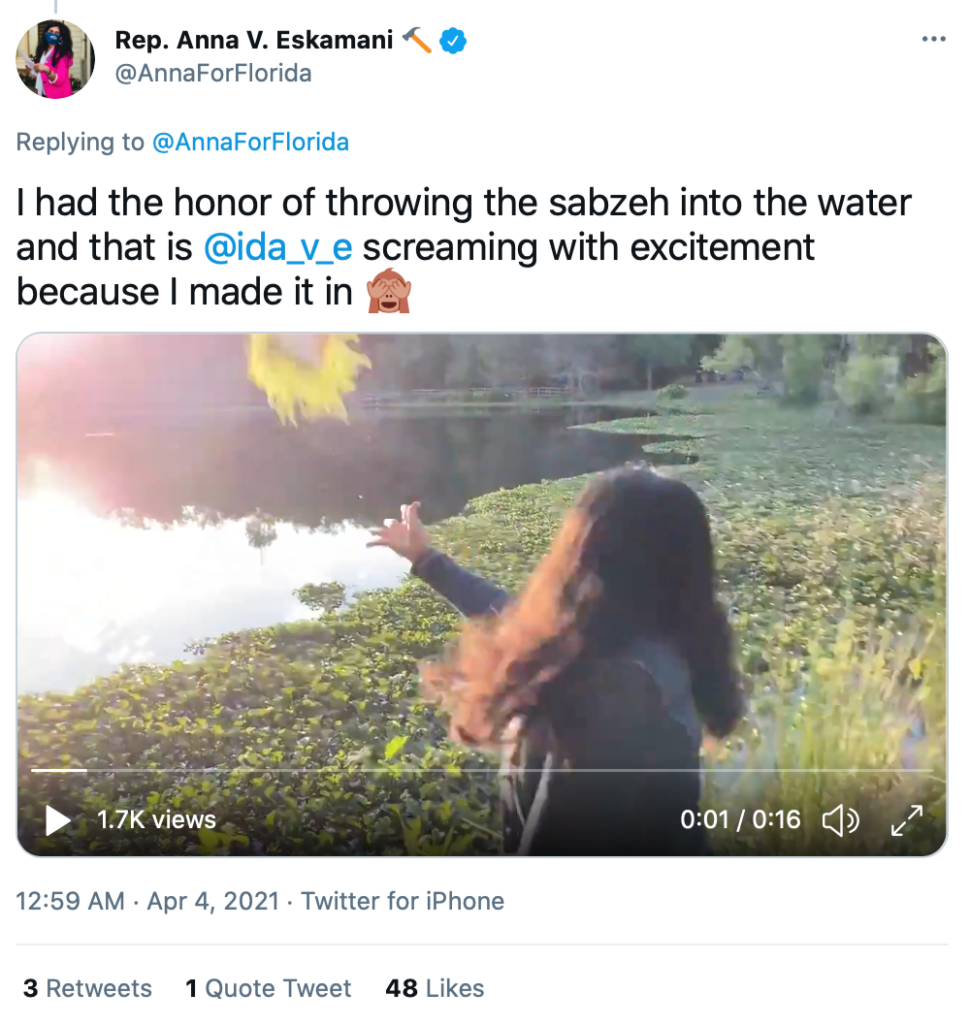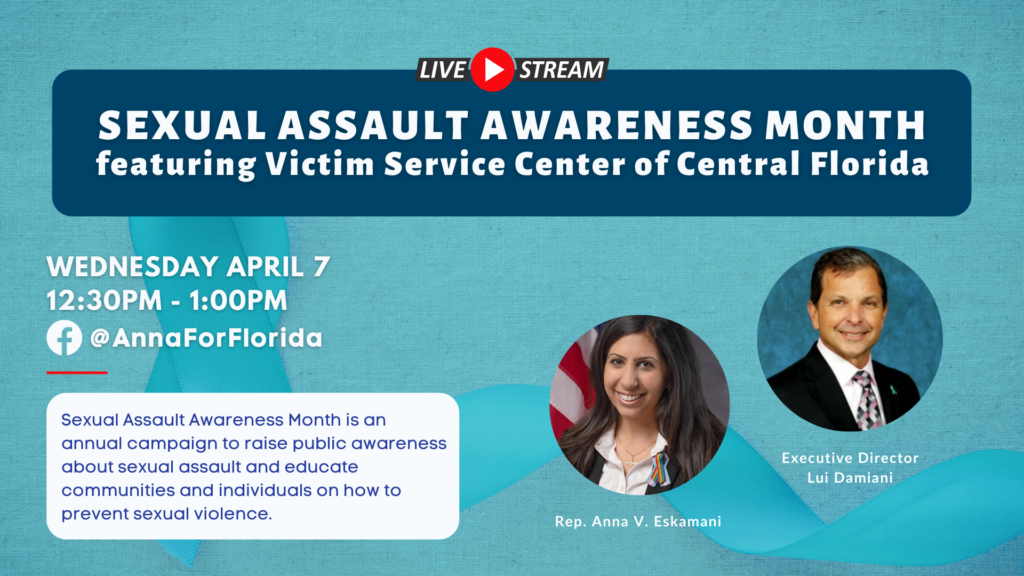Dear Friend,
We’re more than halfway through Florida’s 2021 Legislative Session! And every Monday, we’re sending you an email review of what we’ve been up to in Tallahassee. Click here for last week’s review.
Also, if you’re not doing so already, please consider keeping up to date with us through our social media accounts, including Facebook, Twitter, and Instagram. You can also watch Committee Meetings and Floor Sessions live on the Florida Channel.
Onward together,
Rep. Anna V. Eskamani
UPDATED COVID19 GUIDE
As always, first up is the the latest version of our COVID-19 Guide (español), along with our Unemployment Issues blog post and our guidance for renters. If you are facing issues with your unemployment claim, please fill out our DEO escalation form here.
COVID-19 Vaccine News and Updates
Starting TODAY, all Florida residents shall be eligible to receive any COVID-19 vaccine as prescribed by the Food and Drug Administration. The Pfizer vaccine is authorized for persons age 16 and up. The Moderna and Janssen (Johnson and Johnson) vaccines are authorized for persons age 18 and up. Note that all individuals under the age of 18 receiving a vaccine must be accompanied by a guardian and complete the COVID-19 vaccine screening and consent form. To download a copy of the form, click here.
Orange County officials say they expect demand for the shots to be high over the next three to four weeks, so you’re encouraged to pre-register at ocfl.net/vaccine.
After today, the Orlando FEMA-run mass vaccination site will switch to the single-dose Johnson & Johnson vaccine. Residents will no longer be able to get a first dose of the Pfizer vaccine, which means 16- and 17-year-olds planning to get vaccinated with parental permission will have to go elsewhere. (Again, the Pfizer vaccine is the only vaccine currently authorized for those ages.)
And in another bit of vaccine news:
Meanwhile, the U.S. Department of Housing and Urban Development has posted a valuable resource detailing the housing provisions in President Biden’s $1.9 trillion American Rescue Plan. If you’re struggling with housing insecurity right now, the sweeping COVID-19 relief plan includes billions of dollars for rental assistance, housing vouchers, and other emergency housing programs.
New research suggests that the administration of Gov. Ron DeSantis, who is angling to run for president in 2024, may be undercounting the number of Floridians who have died from COVID-19.
The analysis of excess deaths across Florida found that total deaths across the state during the pandemic were significantly higher than historical trends, even when accounting for COVID-19-related deaths. The findings indicate that “the impact of COVID-19 on mortality is significantly greater than the official COVID-19 data suggest.”
An Environmental Disaster and the Problem of Industry Influence
Florida is in the middle of an environmental disaster right now, as engineering crews and state officials are pumping process water from an old phosphate fertilizer plant in Piney Point directly into Tampa Bay in hopes of avoiding an uncontrolled collapse that could flood surrounding communities and contaminate drinking water sources.
This a very dangerous situation: If you are among the homeowners who have been told to evacuate, please do so.  But this emergency is a reminder of how Florida has failed to confront a much larger problem.
But this emergency is a reminder of how Florida has failed to confront a much larger problem.
Florida has for many years been home to a major phosphate-mining industry, in which millions of tons of phosphate rock are scraped out of the land and then processed into fertilizer for crops. The process results in contaminated byproducts, including radioactive phosphogypsum and acidic process water.
For years, the phosphate industry has been piling the gypsum into stacks and then using those “gypstacks” to hold the process water. These waste containers are enormous: Gypstacks can reach 200 feet tall, cover close to 400 acres, and enclose wastewater ponds of up to 80 acres.
Today, there are about 25 gypstacks around Florida — including the one in Piney Point that’s now at risk of collapse. And many are piled higher ever year. (I strongly encourage you to read “The Clock is Ticking on Florida’s Mountains of Hazardous Phosphate Waste,” a 2017 story by the incredible environmental journalist Craig Pittman.)
These are essentially permanent waste facilities and they’ve been causing environmental problems for years, including overtopping during high winds and overflowing after heavy rains. The Piney Point facility alone has had numerous problems, including a 2011 breach that sent wastewater into a harbor. In just the past year, inspectors have found holes in the gypstack’s liner and potential cracks.
These are the sorts of problems that arise when lobbying by big corporations twist laws in their favor and gut government regulations. And one of the most influential corporations in Tallahassee the company that now dominates Florida’s phosphate industry: The Mosaic Co., which has given more than $3.5 million to Florida politicians and political groups in just the past 15 years.
We need to deal with the immediate crisis in Piney Point. But then we need to hard look reforming this environmentally destructive industry to stop it from prioritizing profits over ecologic and public health.
Tallahassee Republicans Embrace Voter Suppression
There was a lot of attention last week on the opposition to an awful new voter-suppression law in Georgia that, among other things, makes absentee voting much harder, criminalizes giving water to people waiting in long voting lines, and gives the state’s Republican-controlled Legislature more control over the State Election Board. In response to the new law, Major League Baseball announced it will move this year’s All-Star Game to another state.
But we can’t forget that the Florida Legislature is trying to do the same thing here.
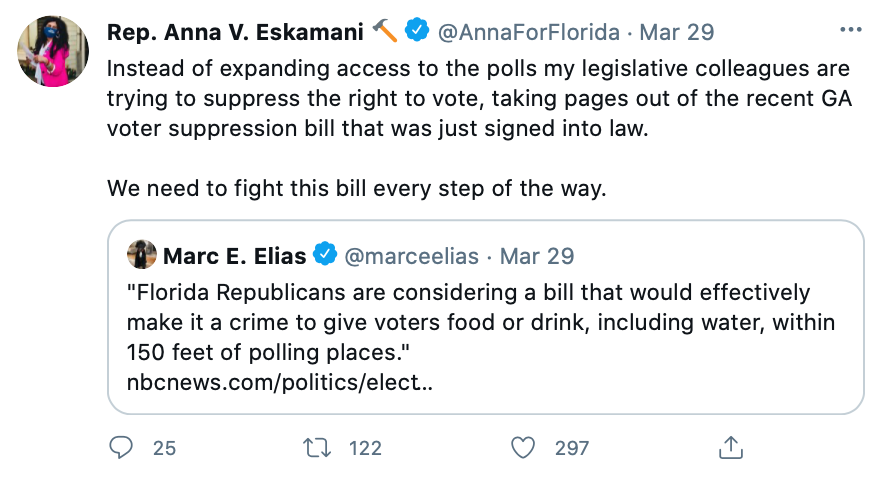 Two bills moving this session (SB 90 and HB 7041) would throw up a thicket of new restrictions on voting, all designed to help Republicans cling to power by making it more difficult for people to vote — especially young folks and people of color.
Two bills moving this session (SB 90 and HB 7041) would throw up a thicket of new restrictions on voting, all designed to help Republicans cling to power by making it more difficult for people to vote — especially young folks and people of color.
Together, the bills would retroactively cancel existing vote-by-mail ballot requests, forcing people to re-request ballots even if they’ve already done so. They would make it a crime to have a friend or caregiver pick up or drop-off your vote-by-mail ballot, which is a major obstacle to working, elderly and mobility-impaired Floridians. They would make it harder to access vote-by-mail boxes, which more than 1.5 million Floridians used in the 2020 elections. And, just like the disgusting new Georgia law, these Florida bills would prohibit anyone from handing out food and water to voters waiting in line to cast their ballots — lines that are often deliberately made longer than necessary.
In response, some groups are now urging companies to speak out against these anti-democratic laws. Others are organizing email campaigns in opposition, which you can join by filling out this simple online form.
The Senate version of this bill is up for another hearing Tuesday in the Senate Rules Committee. All of us need to do everything we can to fight against this bad bill — and for the right of everyone to freely and easily participate in our democracy.
Florida Legislature Reveals Draft State Budgets
Last week the Florida House and Senate revealed their draft legislative budgets, which we will be debating and voting on this week. Despite billions of dollars in federal COVID-19 relief, major budget cuts are being suggested to areas like hospitals and higher-ed institutions while there’s the potential for teacher raises and raises for state employees too. Read more here about the state budget proposals from John Kennedy in the Sarasota Herald-Tribune.
Candidly, a part of these draft budgets that I absolutely disagree with is a permanent raid of the affordable housing trust funds. These funds have been raided for far too long and last week we hosted a virtual press conference to elevate these concerns, speak on Florida’s affordable housing crisis, and to protect affordable housing. Click here to read about this latest attack too.
Republicans Want Everyday Floridians to Pay More Taxes So Businesses Can Pay Less
Two weeks ago, Republican leaders in the House and Senate announced a “grand bargain” that amounts to raising taxes on everyday Floridians in order to cut taxes for businesses. (See my debate here). Now they want to give businesses even more.
Last week, House Republicans added an even bigger gift for businesses to their plan (HB 15, SB 50): A more than 60 percent cut to the tax businesses pay on commercial leases. This will save businesses — but cost Floridians nearly $1.3 billion a year.
So this is the Republican plan: Everyday Floridians like you and I will pay higher taxes on all our Internet purchases through a new online sales tax. But instead of using this extra revenue to pay for investments in services that would help everyday Floridians — from affordable housing and healthcare to cleaner water and better schools — Republicans will spend it instead on permanent tax cuts businesses.
First, they’ll use $4 billion of the new money raised by the online sales tax to pay unemployment insurance premiums that were supposed to be paid by businesses — who already benefit from the lowest unemployment insurance premiums in the country. And then they’ll permanently cut the sales tax on commercial leases from 5.5 percent to 2 percent.
I think it’s important that we help Florida businesses — but the relief should be targeted at our small businesses that were truly hurt by the COVID19 pandemic. It would be irresponsible and wasteful of us to pass giant, indiscriminate, permanent tax cuts that do as much or more to help big corporations and those who actually profited off the pandemic.
For instance, cutting the sales tax on commercial rent would steer some of the biggest savings to giant chain retailers — like Publix, which would save an estimated $9.5 million a year. This is the same Publix whose profits soared by more than 30 percent last year — from $3 billion to $4 billion. (And don’t forget, Gov. Ron DeSantis gave the very biggest corporations $543 million in tax refunds at the start of the pandemic.)
This legislation will be on the House floor this week. We’ll fight hard to make sure consumers get some help, too.
Showering More Tax Breaks On Special Interests
In addition to big business tax cuts, we’re also starting to see a number of special interest tax breaks for politically connected companies surface in the Capitol.
Rental-car giant Hertz wants a $2.3 million tax break. The timeshare industry wants a tax break that could save it — but cost cities, counties and schools — more than $170 million a year. And the online real-estate company Zillow is pushing for a tax break, too.
These are lobbyist-driven, corporate giveaways that give unfair competitive advantages to certain companies over others and drain money away from programs and services that help all Floridians — not just those that make the biggest campaign contributors.
I raised these points last week during questions and debate over the Zillow tax break (HB 623). You can watch my debate on this one starting at 1:28:25 of this video.
And this is just the start: We’re already hearing about more special interest tax breaks for companies like Florida Power & Light and Florida Crystals and more huge cuts for corporations generally and chain restaurants specifically.
You can count on us to keep an eye out for these giveaways — and to call out every single one we see.
A Special Carveout for Publix — At the Expense of Publix Workers
Another special-interest driven bill moving through the Legislature this spring would strip rights away from Publix shareholders — most of whom are Publix employees.
Most shareholders in private companies are protected by something known as “appraisal rights.” These rights come up when a company makes a major decision, like, for example, agreeing to sell itself to a private equity firm. A shareholder who disagrees with that decision can invoke their appraisal rights, which require the company to buy them out at whatever an independent court decides is the fair market value of their shares. These rights are an important protection for minority investors in companies — the folks who don’t own enough shares to influence corporate decisions.
Publicly traded companies are mostly exempted from shareholder rights. That’s because their shares are already traded on open, independent markets — millions of shares are bought and sold every day by unrelated investors and stock prices are updated every second — and so it’s easy for unhappy investors to sell out at a fair price.
But HB 339 would also exempt Publix from most shareholder rights, too, even though Publix is a private company.
This legislation, which was shown to Publix even before it was filed in the Legislature, acts like Publix shareholders have the same protections as shareholders in public companies — even though Publix’s internal “market” is controlled entirely by Publix. It also creates a potential loophole through which other private companies might try and take away rights from their shareholders, too.
I raised a lot of these concerns last week when the bill came before the House Civil Justice & Property Rights Subcommittee. You can watch my questions and debate starting at 5:28 of this video.
A Small Step Toward Fixing Florida’s Broken Unemployment System
After the past year, all of us know just how badly — and deliberately — broken Florida’s unemployment system is for workers. But an audit released last week gave us another glimpse at the depth of the problems.
Auditors found that the Florida Department of Economic Opportunity, the agency that oversees unemployment benefits in this state, couldn’t fully account for nearly $9 billion in federal and state unemployment claims.
I’m happy to report at least some progress on that Florida. Last week, the House finally began moving forward with a bill to overhaul the CONNECT online unemployment system that has failed so miserably since it was designed less than a decade ago. The bill (HB 1463) passed the House Tourism, Infrastructure & Energy Subcommittee unanimously last week.
Unfortunately, the House has yet to do a thing to address the more fundamental problems with Florida’s unemployment system — from using a needlessly cruel eligibility formula that freezes many workers out of any benefits at all to paying the workers that do qualify some of the cheapest benefits in the country.
The session isn’t over and we’re still fighting on this front, through. In fact, I’ll be offering some amendments this week to fix some of these systemic problems.
The workers of Florida deserve far, far better treatment from a Legislature that has over the past two decades become utterly beholden to big corporations. And remember: A smoothly functioning and genuinely supportive unemployment system helps all of us, because unemployed workers spend their benefits on basic needs that in turn help sustain our economy.
And while corporate lobbyists — and the politicians they buy with their campaign contributions — like to claim higher unemployment benefits disincentive people from returning to work, that is simply not true. In fact, a new working paper released last week by professor at the University of Massachusetts at Amherst found that high unemployment benefits led to *higher* employment levels.
Vendor-Driven Hearing Aid Bill Could Put Kids at Risk
Unfortunately, the House also moved another special interest bill last week: This one for a company that wants to sell hearing aids online without any oversight from medical experts.
HB 957 is being pushed by a company called Redesign Health (the parent company of Lively Hearing), a for-profit distributor of hearing aids that has hired one of the biggest lobbying firms in Tallahassee. The legislation would repeal a law that prohibits companies from selling hearing aids directly to patients through the mail.
Ears are incredibly sensitive organs, and a hearing aid that’s installed without an audiologist to evaluate the patient and oversee the fitting can end up doing more damage — especially to children. And unfortunately this bill could allow companies selling hearing aids to bypass that vital medical supervision.
We heard from many parents of children with hearing loss worried about kids being put at risk. Some of my Democratic colleagues and I also warned about the potential for vendors to prey in particular on lower-income Floridians, who might feel they have no choice but to turn to a lesser-regulated option that may be cheaper — but is also more dangerous.
This is a bill that attempts to force Floridians into an unfair choice between access and quality in healthcare. They deserve both.
I voted against this bad bill. You can watch my debate against it starting at 2:30:46 of this video.
‘Parents’ Rights’ Law Could Force Schools to Out LGBTQ+ Students
By a largely party-line vote, the House last week approved a controversial bill that supporters have dubbed the “Parents’ Bill of Rights.”
Republican supporters of the bill (HB 241) say they want to give parents more control over the education and healthcare of their children.
But I’m very concerned that this bill will hurt some vulnerable children — especially our LGBTQ+ kids, who might not feel safe speaking to their teachers or counselors about their gender identity or sexual orientation if educators have to report those conversations to parents who might be supportive. I also worry that this legislation will deter kids from seeking answers to questions around reproductive health and contraception.
You can watch my debate against this bill starting at 23:03 of this video.
More Tallahassee Attacks on Home Rule
Unfortunately, it was a tough week for local control.
The full House of Representatives passed HB 735, which prevents cities and counties from regulating a wide range of professions and occupations. This could prevent our local governments from doing everything from licensing daycare facilities to making sure that lobbyists have to disclose the clients they are representing at City Hall.
The House also passed HB 663, which would tie local governments’ hands when it comes to the safety of food products sold through the mail.
Meanwhile, the House Ways & Means Committee approved HB 337, which would impose new limits on the authority of cities and counties to charge impact fees — the fee charged on new development that is supposed to ensure that growth doesn’t overwhelm our schools, roads, parks and police. All limiting impact fees does is shift the tax burden from developers to residents.
And the House Civil Justice & Property Rights Committee passed HB 1167, which would expand a terrible law the Legislature passed in 2019 that makes it harder for communities to save trees. The original law allows residential property owners to ignore local ordinances and cut down trees; this bill lets owners of mobile home park ignore those tree ordinances, too.
I voted against all of these bills, because local governments are the closest to the people and the many diverse cities and counties across our state should be able to make decisions about their own communities. And it is utter hypocrisy for a Florida Legislature that is constantly complaining about overreach by the federal government to continually strip away powers from cities and counties — usually in response to lobbying by special interests who know they can dictate the agenda in Tallahassee.
I have to say, I was especially irritated by the bill expanding that 2019 anti-tree law — a law that I think is so bad that I filed a bill this year to repeal it. (Of course, that legislation hasn’t even been given a single hearing). You can watch my questions and debate on this bill starting at 19:50 of this video.
What Anna’s Reading
I wanted to flag two stories that I hope you can find time to read.
The first, by Mary Ellen Klas of the Miami Herald-Tampa Bay Times Tallahassee Bureau, takes a deep dive into how campaign contributions by Big Sugar contaminate the Florida Legislature.
We’re seeing the results of that influence first hand this session, as the top priority of Senate President Wilton Simpson — a Republican who wants to run for agriculture commissioner in 2022 — is a bill that would protect Florida Crystals Corp. and U.S. Sugar Corp. from a class-action lawsuit over the health problems caused by their sugarcane burning.
“After sugar’s $11 million flex, Florida lawmakers push to protect industry”
The second story comes from Slate, and it reminds how the stressful and chaotic scramble for COVID-19 vaccines — in which wealthy and white people have had an easier time getting vaccinated than lower-income folks and people of color — is the same cruel and discriminatory healthcare landscape that women have been forced to deal with for years as Republican-controlled states have tried to shut down reproductive healthcare clinics.
As Slate writes, “Access to vital, lifesaving health care becomes purely a function of whom you know, how fluent in English and how mobile you may be, and, of course, how much money you have.”
I hope this pandemic makes us all a bit more empathetic for the struggles of women who lack access to healthcare. And abortion is healthcare.
“Will This Vaccine Debacle Help Us Realize Why Abortion Access Is Such a Big Deal?”
Speaking Out So We Can Build a More Equitable World for Women
In case you missed it last week, the New York Times reported that U.S. Rep. Matt Gaetz is under investigation for possible sex trafficking of a minor in a probe that appears to have begun with a separate investigation into the now-indicted former Seminole County Tax Collector Joel Greenberg.
News of the investigation — and the subsequent reports of abusive and exploitative behavior toward women — prompted me to share a story I hadn’t talked about publicly before about the two men, whom I had no friendship with at all, leaving me a creepy voicemail two summers ago.
I shared that story for two reasons: To show folks the kind of uncomfortable, unwanted advances so many women have to put up with from men and to encourage others who either participated or witnessed inappropriate behavior — in Tallahassee, Washington or anywhere else — to speak out. We’re not going to change culture and build a more equitable society unless we do it together.
I also did an interview about the experience on The ReidOut with Joy Reid on MSNBC. You can watch that interview here.
Another Busy Week!
Here’s a sampling of some of the events Team Anna participated in and folks we heard from this week:
ANNA IN THE NEWS
Florida House Passes Parental Rights Measure
DEO now requiring ID verification for those filing a claim
Experts: Pandemic Leaves More Than 600K Floridians Behind on Their Rent
Florida Legislature votes to protect businesses from COVID-19 lawsuits
REMINDER: UPCOMING EVENTS
Sexual Assault Awareness Month
This Wednesday at 12:30 p.m., I will join Lui Damiani, the executive director of the Victim Service Center of Central Florida, to raise awareness of sexual assault prevention, share local resources and outline ways we all can help. The half-hour event will be streamed live at facebook.com/AnnaForFlorida. And if you or someone you know has experienced sexual assault, please know call the Victim Service Center’s 24-hour hotline: 407-500-HEAL (4325)
